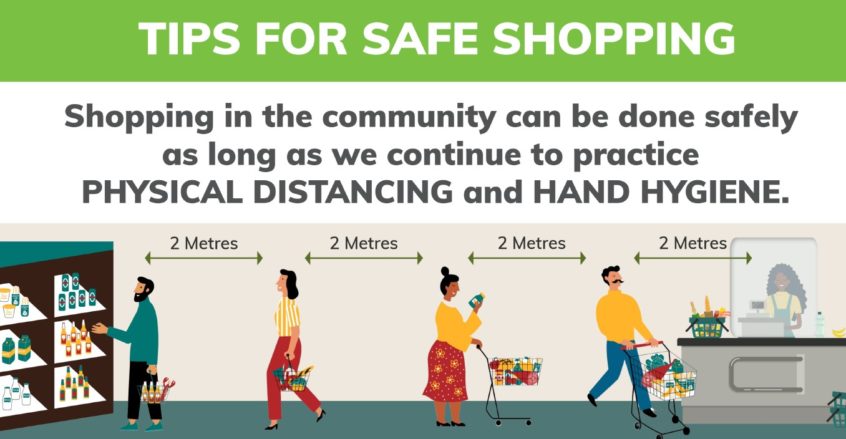As businesses start re-opening, we are here to help you prepare and take the necessary steps to stay safe when going out for essential trips in the community. How we experience, navigate and operate retail environments to prevent the spread of COVID-19 will need to be continuously monitored and adapted. Here is Dr. Colby talking about the variety of control measures needed to protect us:
So you need to make a shopping trip in the community… now what?
Continue Reading or DOWNLOAD OUR GUIDE
Ground Rules:
- People who are ill (even if mild) or who are self-isolating should not go out to stores. Ask a family member, friend, or neighbour to pick up essential supplies or get them delivered (see the CK Food Policy Council list of meal and grocery delivery services.) If you have questions about your unique situation call the CK Public Health COVID-19 intake line at 519-355-1071 x 1900 so we can help guide you properly.
- Shopping in the community can be done safely, as long as we practice good health hygiene. Remember to:
- limit the number of times you shop to once per week or less;
- order what you can online or over the phone, and use curbside pick-up or delivery options as much as possible;
- limit the number of stores you visit in one trip.
Before leaving home:
- Do some research. Call the store or visit their website to learn what measures they have in place to prevent the spread of COVID-19.
- Shop Familiar Places. Plan to go to a store you are familiar with and know where to find the items you need.
- Make a shopping list. Planning what you need ahead of time will help you get in and out of the store as quickly as possible and decrease the time you spend around other people. Check out our article on Menu Planning and Eating on a Budget during COVID-19 for some ideas.
- Plan to shop alone and avoid busy times if you can.
- Manage expectations. The way services are provided will change as guidelines change. Shopping trips might look different and we may experience minor inconveniences, like waiting in line or limits on the number of items. Follow the processes the store has put in place. These measures are for the safety of both customers and staff. We all need to do our part.
- Wash your hands with soap and water for at least 20 seconds before leaving home.
- Bring 70% alcohol-based hand sanitizer to use during your trip.
While shopping:
- Use 70% alcohol-based hand sanitizer upon entering the store, if it is available. It should take about 20 seconds to fully rub in the hand sanitizer and allow it to dry completely.
- You can wipe down a cart or basket, if wipes are available. (some stores may be doing this task as well)
- Avoid touching your face at all times while shopping.
- Try to be mindful and patient. Keep 2 metres (6 feet) apart from others in the store, about the length of two shopping carts. This may be challenging to do in smaller stores or narrow aisles. You may have to wait a few minutes until there is enough room to get what you need.
- Follow any markings and signs in the store (e.g.: arrows on the floor showing what way to go down an aisle).
- Get what you need and avoid prolonged browsing or conversations.
- Take what you touch. For example, picking fresh produce normally requires touching for desired ripeness, but right now it is best to use your eyes to look for bruises or brown spots. Only touch the items you plan on buying.
At the check-out:
- Keep 2 metres (6 feet) apart from others. This can be hard to do in the narrow space at the check out. Many stores are using markings, signs, or barriers at check-outs to help customers keep their distance.
- You can choose to use a self-checkout or checkout serviced by a staff. Both options are safe to use as long as physical distancing can be maintained.
- Wash or sanitize your hands after paying, if you need to touch a machine or screen, and keep your hands away from your face.
When you get home:
- There is no need to disinfect items or leave items outside after shopping. The virus does not thrive on surfaces and there is no evidence that the virus can be spread through food.
- Wash your hands with soap and water for 20 seconds when you enter the home and after handling shopping goods.
- Follow usual food safety practices for groceries. Give fruits and vegetables a good rub under cool or lukewarm running water. It is not recommended to use soap, detergents, or any chemicals for cleaning produce.
- There is no need to wash your coat, change your clothing, or disinfect footwear after shopping.
- Drop off supplies while practicing physical distancing, if shopping for someone else outside your home (e.g.: drop items off at the door, call or ring the doorbell, and step away).
- Wash your hands right away and again after unpacking any supplies if you need to enter someone else’s home to assist with unpacking or other activities.
- Practice physical distancing on public transitg. keep 2 seats in between you and others, clean your hands after the ride and keep hands away from your face.
If you have questions about your unique situation or experience, please call the CK Public Health COVID-19 intake line at 519-355-1071 x 1900 or email us at covid19@chatham-kent.ca

